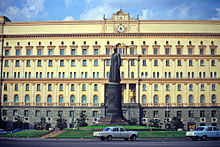K.G.B.
| Комитет Государственной Безопасности КГБ СССР Komitet Gosudarstvennoj Bezopasnosti KGB SSSR |
|
 |
|
 Lubyanka Building in 1991 |
|
| Agency overview | |
|---|---|
| Formed | 13 March 1954 |
| Preceding agencies | |
| Dissolved | 6 November 1991 (de facto) 3 December 1991 (de jure) |
| Superseding agency |
|
| Type | State committee of union-republican jurisdiction |
| Jurisdiction | Soviet Union |
| Headquarters | Lubyanskaya ploshchad, 2, Moscow, Russian SFSR |
| Motto | Loyalty to the party - Loyalty to motherland Верность партии - Верность Родине |
| Agency executive |
|
| Parent agency |
Central Committee of the Party Council of Ministers of the Soviet Union |
| Child agencies |
|
The KGB, an initialism for Komitet gosudarstvennoy bezopasnosti (Russian: Комите́т госуда́рственной безопа́сности (КГБ); IPA: [kəmʲɪˈtʲet ɡəsʊˈdarstvʲɪnːəj bʲɪzɐˈpasnəsʲtʲɪ], translated in English as Committee for State Security), was the main security agency for the Soviet Union from 1954 until its break-up in 1991. Formed in 1954, as a direct successor of such preceding agencies as Cheka, NKGB and MGB, a committee was attached to the Council of Ministers. It was the chief government agency of "union-republican jurisdiction", acting as internal security, intelligence and secret police. Similar agencies were constituted in each of the republics of the Soviet Union aside from Russia, and consisted of many ministries, state committees and state commissions.
The KGB was a military service and was governed by army laws and regulations, similar to the Soviet Army or MVD Internal Troops. While most of the KGB archives remain classified, two online documentary sources are available. Its main functions were foreign intelligence, counterintelligence, operative-investigatory activities, guarding the State Border of the USSR, guarding the leadership of the Central Committee of the Communist Party and the Soviet Government, organization and ensuring of government communications as well as combating nationalism, dissent, and anti-Soviet activities.
...
Wikipedia
